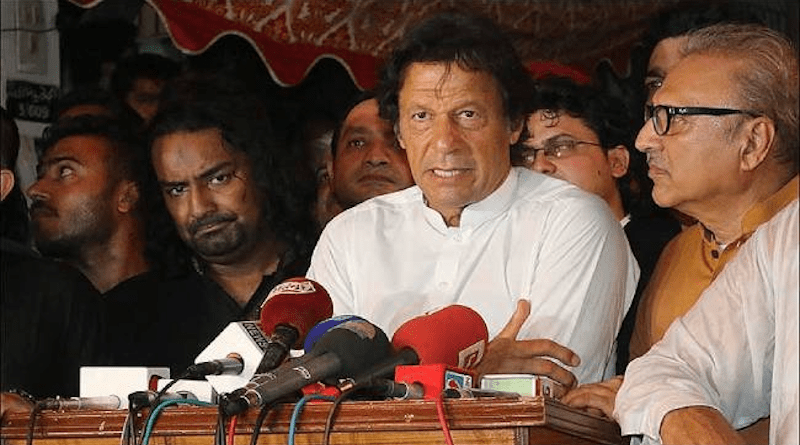Deciphering Media’s Role In Age Of Fake News And Mob Politics: A Case Study Of Imran Khan’s Politics – OpEd
By Dr. Sahibzada Muhammad Usman
Fake news has always been a potent weapon in political warfare, but the rise of social media platforms and digital technology has exponentially amplified its potential for harm. This article explores the role of fake news and media in the unrest caused by the mob politics of Imran Khan, the former cricketer turned politician, and the ex-Prime Minister of Pakistan.
The advent of Imran Khan’s political career brought a wave of change in Pakistan’s political landscape. His party, the Pakistan Tehreek-e-Insaf (PTI), promised to end corruption and bring a “Naya Pakistan” (New Pakistan). Yet, Khan’s political tenure has been marred by accusations of mob politics, protests, and a rising tide of unrest, with the media playing a pivotal role in bringing these issues to light.
However, the media landscape today is as much a part of the problem as it is a solution. The rise of fake news, or disinformation, has muddled the waters of public discourse and fueled unrest. These manufactured news stories, often spread through social media platforms, have exploited existing divisions, fanning the flames of dissent and contributing to the political instability that has come to define Khan’s political tenure.
Imran Khan’s political strategy, often termed ‘mob politics,’ involves mobilizing massive crowds to apply pressure on political opponents and institutions. While this approach opens the door for misinformation to flourish. In the tumultuous climate of a political rally, fact-checking becomes an afterthought, allowing fake news to spread unchallenged.
Media’s role in this context is twofold. On one hand, it has a responsibility to report on the political climate, including the escalating unrest. On the other hand, it can unwittingly become an amplifier for fake news, especially if it fails to verify the information before broadcasting it.
The situation is further complicated by the fact that PTI’s supporter has often been accused of suppressing press freedom. Journalists and media outlets that criticize PTI or expose corruption have been subjected to harassment, or worse, leading to an atmosphere of fear and self-censorship. This stifling of independent media gives fake news an even larger stage, as it allows for unverified and biased information to take precedence over balanced, factual reporting.
However, the media is not solely to blame. The proliferation of fake news is also a symptom of a polarized society, where people are more likely to believe information that aligns with their existing beliefs and dismiss anything that challenges them. This cognitive bias, known as confirmation bias, is not unique to Pakistan but is a global phenomenon.
In this context, the role of media literacy becomes crucial. Media consumers need to be educated about the dangers of fake news and how to identify it. Fact-checking organizations, along with responsible journalism, play a vital role in this regard. They can debunk false stories, provide context, and promote a more nuanced understanding of complex issues. Moreover, social media platforms must also take responsibility for their role in the spread of fake news. These platforms can use algorithms to limit the spread of fake news and provide more visibility to fact-checked, reliable information.
Imran Khan’s mob politics have undeniably added to the unrest in Pakistan. The media’s role in highlighting this unrest is vital to holding power to account. However, the media must also be vigilant against the spread of fake news, which only serves to amplify tensions and cause further harm.
The battle against fake news is a collective effort. It requires media outlets to prioritize fact-checking and balanced reporting, social media platforms to regulate the content shared on their sites, and individuals to critically evaluate the information they consume.
In the case of Imran Khan’s mob politics, the media has a crucial role in reporting on the unrest and holding PTI accountable. However, it should not lose sight of its ethical obligations in the process. Sensationalist reporting, lack of fact-checking, and spreading unverified information can cause more harm than good.
The rise of fake news also calls for a reevaluation of journalistic standards. In an era where anyone with a smartphone can be a news source, traditional media outlets must reinforce their commitment to accuracy, fairness, and objectivity. This entails rigorous fact-checking, giving a voice to all sides of a story, and avoiding the temptation to chase viral trends without verifying their authenticity.
In conclusion, the unrest fueled by Imran Khan’s mob politics is a complex issue, deeply intertwined with the larger problem of fake news. The media plays a crucial role in highlighting the issue, but it must also be cautious not to contribute to the spread of disinformation. It is a delicate balancing act, requiring a commitment to journalistic ethics, a proactive approach to fact-checking, and a dedication to promoting media literacy among the public. The battle against fake news isn’t a solitary fight for one party, but a collective responsibility of all stakeholders – the government, media outlets, social media platforms, educational institutions, and the public.
Dr. Sahibzada Muhammad Usman, Research Scholar and Academic; Ph.D. in Political Science at the University of Pisa, Italy. Dr. Usman has participated in various national and international conferences and published 30 research articles in international journals.

